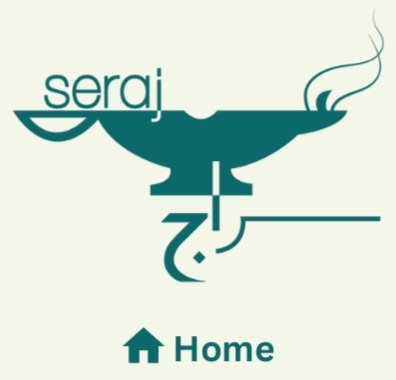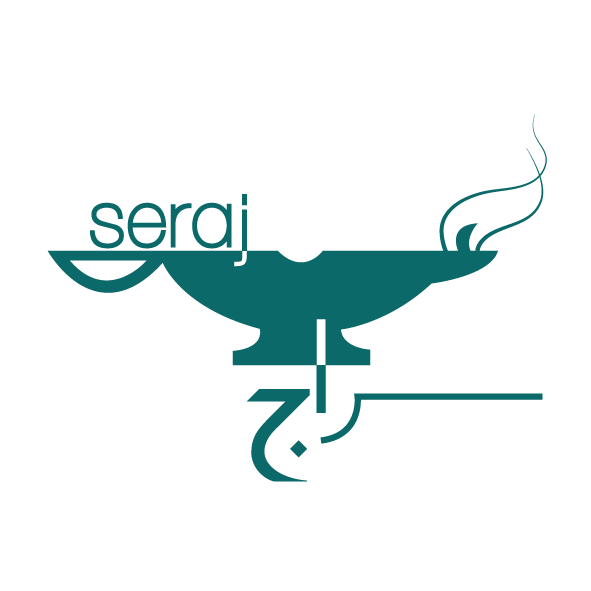
How it all began & grew
Seraj was founded in 2005
Mary Ann Weston, Seraj Volunteer
The inspiration for the Seraj Library Project came from Estephan and Laurie Salameh’s shared love of books and their commitment to bringing knowledge and engagement with the world to isolated villages and refugee camps of Palestine.
It all started when Estephan, who was born in Jerusalem, was working on a graduate degree at North Park University in Chicago, a school founded by the Evangelical Covenant Church. He came to North Park from Palestine on a scholarship with half a month’s rent in his pocket. To augment his funds, he taught Arabic to North Park students and the greater Chicago community. Among his students was Laurie Millner who was studying for a master’s degree in nonprofit management. They married in 2004.
Estephan and Laurie pondered how they could improve the situation in Palestine, where some 4 million Palestinians live severely constrained lives under Israeli occupation. Their conversation kept coming back to libraries for children.
Libraries seemed a perfect fit in Palestine, where the culture is very family-oriented and puts a high value on education. According to the Central Intelligence Agency’s World Factbook, more than half of West Bank residents are under age 25 and almost 97 percent of those over age 15 are literate. Palestinians are a people hungry for knowledge. But, according to the Palestinian Central Bureau of Statistics, only 3 percent of households indicate they have access to a library or the Internet after school hours.
Many Palestinians live in communities isolated from one another and the rest of the world. The only Israelis they see are soldiers. To the Salamehs, libraries, with books, computers and Internet connections, seemed a logical bridge to the outside world. The villagers “need to know each other, to connect with the global community,” Estephan said. They need to know “that there are people who care about Palestine,” Laurie added. “There is nothing about this that does not support peace.”
Seraj, the Arabic word for oil lamp or light, was chosen as the project’s symbol. It is an apt metaphor. According to the Seraj website, the project’s mission is “to assist in the education of Palestinian villagers of all ages and faiths through the development of high quality and accessible library programs. The project is based on the belief that civic education is the best route to democracy, human rights and peace.”
To understand the challenges the Salamehs’ project faces, consider the situation of the West Bank: For a half century the tiny territory has been under Israeli military occupation. The area—smaller than the state of Delaware--is dotted with hundreds of military checkpoints and roadblocks. It can take hours to travel 25 miles; sometimes it’s impossible. Israeli military authorities, acting in the name of security, can and do confiscate Palestinians’ land, demolish their homes and abduct children from their beds at night. Israeli settlements, illegal under international law, have brought over 400,000 Israeli Jews to the West Bank, where they live in fortified communities serviced by exclusive roads and guarded by troops. The settlements have been built on land that was to become part of an independent Palestinian state. Snaking through the landscape is the “separation barrier” a fortified wall and fence that has usurped about 10 percent of West Bank land. Both Palestinians and settlers fear violence from the other.
As a native Palestinian Estephan knew well the obstacles to their project; Laurie was learning fast. After Estephan had completed his doctorate at the University of Illinois at Chicago, they returned to Palestine with $8,000 raised from American supporters to establish the first Seraj library. They started in Estephan’s home village of Jifna. They erected shelves and brought in Arabic picture books and hoped 10 children would show up. More than 30 did. “It was a great success,” Laurie said. The road to that opening had not been completely smooth, however. At first older village residents were not supportive. But younger ones were keen on the idea, so the Salamehs decided to try.
Now there are eight libraries (with two more in development), each carefully selected by Estephan, Laurie and the Palestinian Seraj advisory council, each with a local partner organization or group that will run the library. “Every time we open a new library, it never fails to bring tears to my eyes to see kids rushing into the room to get to the books,” Laurie said. Keys to the libraries success are careful advance planning and local control. The Salamehs vet each community and organization that seeks a library. They look for communities with suitable space and committed volunteers. “There’s no one size fits all [model],” Laurie said. The Salamehs’ strategy has been to set up libraries, then leave their governance to local groups. “Our role is mediators, supporters, but we don’t interfere,” Estephan said.
“The libraries we establish with your support are not cemeteries of books; they have become centers of change providing the right environment for children, youth and young adults, particularly women and girls to become drivers of change in their own communities,” he told donors recently.
Each library has its own character, depending on local desires. “We’re not managers. We want the community to feel ownership,” Estephan said. Sometimes the library is the village’s only open public space where women can meet outside the home. At one library women do traditional Palestinian cross stich embroidery while their children read. The embroidery provides added income. The Kufor Ni’meh library started a program called “My Father Reads to Me,” to get parents involved in the library. Libraries have hosted movie nights, traditional dance programs, theater, lectures, reading competitions and more. They have become “more than libraries in the physical sense and more like a community center with a library,” Laurie said.
One of the libraries is in the Aida refugee camp near Bethlehem. The camp’s 6,000 residents were displaced from 41 villages in what is now Israel. The library is sponsored by the Alrowwad Cultural Center. It’s a “beautiful, creative space,” said Abdelfattah Abusrour, founder and general director of Alrowwad. Estephan and Laurie Salameh, he said, are “great people,” who “continue to follow up on all levels.” “It is a good partnership,” between Alrowwad and Seraj, he said.
In another village, the library gave out 300 small notebooks to children. On each page they were to write a summary of a book they read. When the competition ended, an impressive 175 children had completed their notebooks.
A current focus is storytelling, reviving an old Palestinian tradition. That’s because Fida’a Ataya, the library program coordinator and only staff member, is a professional storyteller.
During the holy month of Ramadan, when observant Muslims fast from sunup to sunset, several libraries became gathering spots for post-fast celebrations. Storytelling took center stage. As a Seraj newsletter put it, “It's an age-old tradition, from the very beginnings of Ramadan, for Arab Muslim communities to gather together after breaking the fast for music, story-telling, poems, reconnecting. …“Our coordinator, Fida'a… told new and traditional stories. Members of each community performed on traditional musical instruments, danced dabke, recited poetry. Expectations for 50–80 villagers to attend were blown away when hundreds appeared, nearly 400 in one village. In another village the laughter was so loud it was heard in the neighboring village.”
The hiring of Fida’a Ataya was part of the Salamehs continuity plan for the libraries, which have been run by volunteers. In addition to coordinating library activities, she is training the libraries’ new interns in storytelling. Seraj had 17 interns last year, local college students who receive tuition assistance to volunteer and mentor at the libraries.
The Salamehs volunteer their time, as do village coordinators. Estephan’s “day” job is an adviser to the Palestinian Prime Minister. Laurie has a Master's degree in Nonprofit Administration from North Park University and is currently the director of Seraj Library Project. She was previously the Vice Chairman of the board of World Vision Jerusalem.
An advisory board in Palestine oversees the direction and vision of the project there. A board of directors in the U.S. raises funds, mostly from individuals and churches. The 2018 fiscal year income exceeded $150,000, including funds for starting two more libraries.
“We might be the smallest organization in Palestine in funds, but we make the best use of our funds. All goes to the community,” Estephan said.
-Mary Ann Weston, Washington DC
July 2018
The meaning of Seraj
To tell you the meaning of Seraj we must go back to our roots, Palestine. Seraj is an Arabic word which means light, not just any light but the light from the old oil lamps used to light homes. In this day in age, people use oil lamps as antique decor for homes or hotels. You bring us the oil, and we carry the light!Watch some of our historical videos
Below are some of Seraj’s historical videos that were made close to the time of our foundation 2005 or you could check out our full, and new list of videos by going to the videos section that you can find in the header.
Video made in February 2013.
Video made in November 2012.
Video made in October 2015.
Video made in October 2016.







